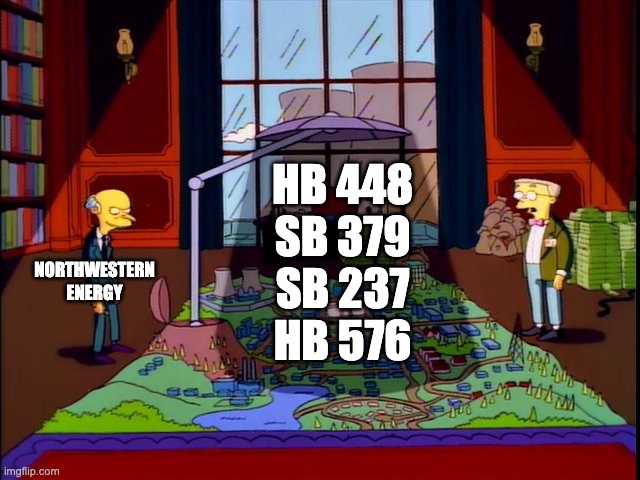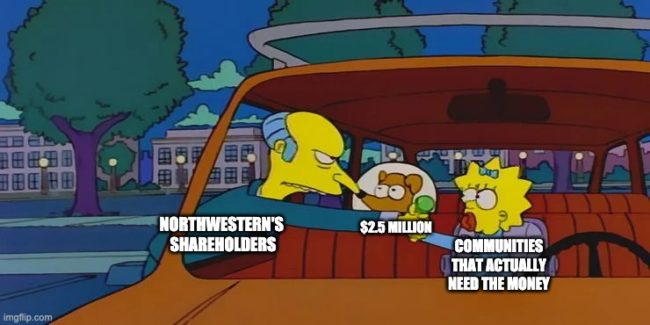
By Conor Ploeger
“I call this enemy, the sun.”
– Mr. Burns
Stop me if you’ve heard this one before, but the Simpsons did it first. No, I am not talking about the show’s past predictions such as Disney buying Fox, Super Bowl wins, or even Donald Trump’s presidency. Instead, I am talking about one of its most notorious characters: Mr. Burns.
Like the Springfield Nuclear Power Plant, NorthWestern Energy’s leadership has taken its cues from a cartoon villain as it continues its crusade to stop the development of renewable energy throughout Montana. NorthWestern may have even found a loyal Mr. Smithers (Sen. Fitzpatrick) who is willing to carry out its dirty work when necessary. If anything, this session illustrates the boundless greed of NorthWestern Energy’s leadership and the villainous role it insists on playing in the State.
One of the most heartbreaking examples is HB 448. Introduced by Rep. Kassmier, HB 448 was a good bill that NorthWestern hijacked to ensure that it became a bad bill. The bill originally intended to raise the cap for commercial rooftop solar customers from 50 kW to 350 kW. It received overwhelming bipartisan support coming out of the house. But then NorthWestern stepped in. Now, the bill has been amended to force the Montana Public Service Commission to reevaluate the rates for rooftop solar customers, something it just did, and would result in increased prices for rooftop solar customers across the state. In other words, the bill could almost destroy the rooftop solar industry in Montana. At this point, if NorthWestern’s leadership had the ability to block the sun, it would do so.
Another example is NorthWestern’s attacks on the Renewable Portfolio Standard (RPS). The RPS requires large-scale utilities (i.e., NorthWestern) to purchase a certain amount of their electricity from renewable projects by a certain date. During this legislative session, numerous bills have been introduced to repeal the RPS. HB 475, for example, would effectively eliminate the standard by allowing NorthWestern to claim that its existing 100-year old hydroelectric dams meet the requirements under the RPS even though the purpose of the RPS was to encourage the development of NEW renewable energy. Unfortunately, other bills are equally nefarious.

SB 237 would repeal a provision in the RPS that requires NorthWestern Energy to purchase some of its renewable electricity from smaller, community renewable projects. The loss of this requirement would be bad enough for communities across the state that would benefit from clean energy investments, but what’s worse is the provision in the bill that would directly harm low-income and tribal energy assistance programs. In 2019, a district court judge ruled that NorthWestern failed to comply with the law when it failed to buy renewable energy from smaller, community projects. As a result, NorthWestern’s shareholders were on the hook for a $2.5 million penalty. That penalty money is supposed to go to low-income and tribal energy assistance programs.
SB 237 would retroactively eliminate those fines, and ensure that NorthWestern would not have to pay the money its shareholders currently owe. It’s a shameless ploy, almost akin to stealing candy from a baby just because you want to see if you can do it. Now, even HB 576, a bill to repeal the RPS, has amendments that seek to apply the repeal retroactively just to be doubly sure that NorthWestern’s shareholders aren’t required to pay the penalty to low income and tribal energy assistance programs.
NorthWestern Energy’s leadership has done an “excellent” job demonstrating its villainy this session. Unfortunately, renewables continue to be a favorite target of theirs. Whether it is hindering the development of rooftop solar across Montana, or punishing communities that hope to benefit from renewable development, NorthWestern leader’s continue to make their disdain for renewables evident. Clearly, they fear the changing status quo – one in which renewables become more affordable and coal continues to decline in the marketplace – and it is doing everything it can to maintain its profits regardless of its customers. Or as Mr. Burns would put it “I’ve got a monopoly to maintain!”
By Conor Ploeger

